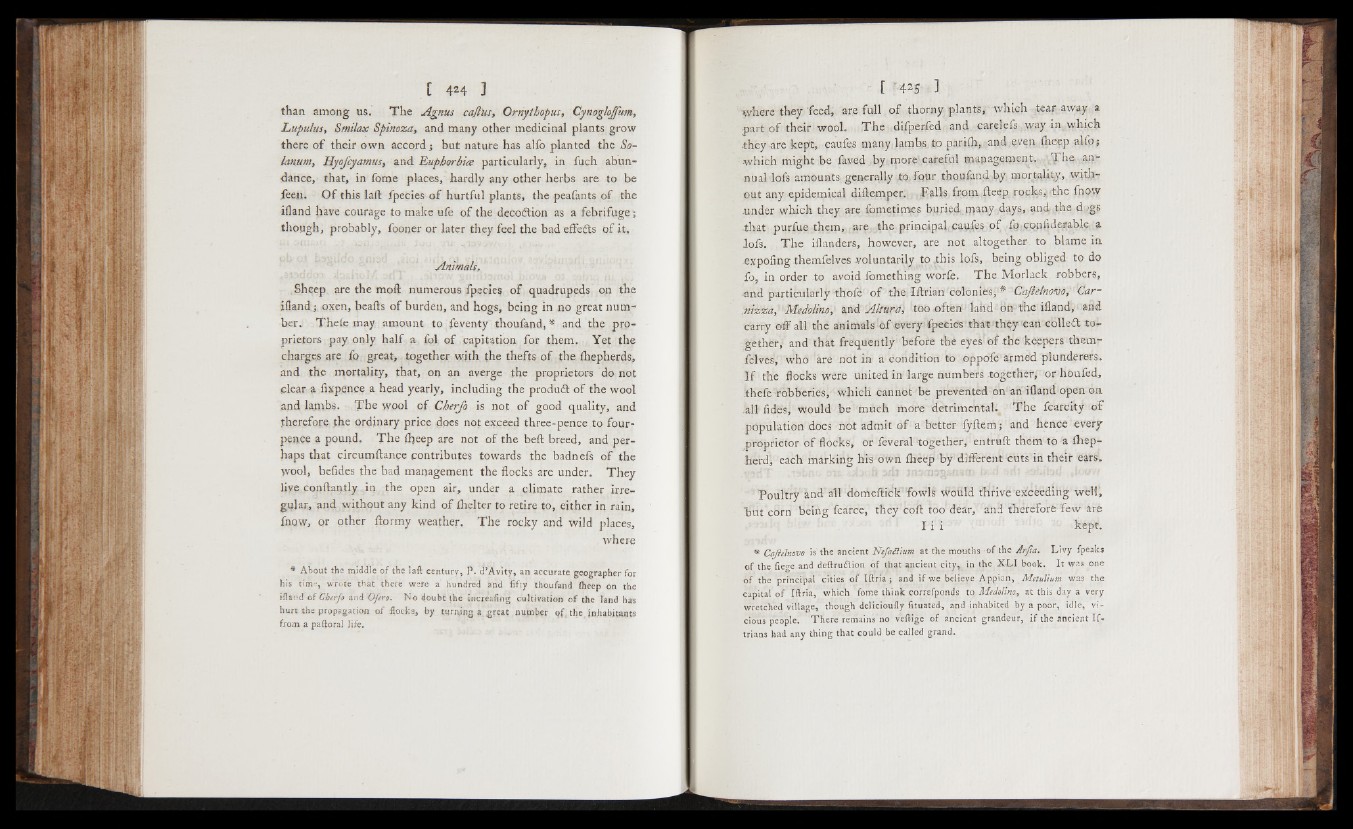
than among us. The Agnus cajhis, Ornythopus, CynogloJJum,
Lupulus, Smilax Spinoza, and many other medicinal plants grow
there o f their own accord j but nature has alfo planted the So-
lanum, Hyofcyamus, and Euphorbia particularly, in fuch abundance,
that, in fome places, hardly any other herbs are to be
feen. O f this laft fpecies o f hurtful plants, the peafants of the
iiland have courage to make ufe o f the decoftion as a febrifuge j
though, probably, fooner or later they feel the bad effeits of it,
Animals,
Sheep are the moil numerous fpecies o f quadrupeds on the
iiland; oxen, tieafts o f burden, and hogs, being in no great number.
Theie may amount to feventy thoufand, * and the proprietors
pay only half a fol of capitation for them. Yet the
charges are ib great, together with the thefts o f the ihepherds,
and the mortality, that, on an averge the proprietors do not
plear a fixpence a head yearly, including the produit o f the wool
and la.mbs. The wool o f Cherfa is not o f good quality, and
therefore the Ordinary price does not exceed three-pence to four-
pence a pound. The iheep are not of the bell breed, and perhaps
that circumftance contributes towards the badnefs of the
wool, beiides the bad management the flocks are under. They
liye conftantly in the open air, under a climate rather irregular,
and without any kind o f ihelter to retire to, either in rain,
fnow, or other ftormy weather. The rocky and wild places,
where
* About the middle of the laft century, P. d’Avity, an accurate geographer for
his time, wrote that there were a hundred and fifty thoufand iheep On the
iiland of Chirp and Ofere. No doubt the increafilvg cultivation of the land has
hurt the propagation o f flocks, by turning a,.great number of, the inhabitants
from a paftoral life.
where they feed, are full o f thorny plants, which .tear away a
part o f their wool. The difpetfed.'and care! cl's way in which
■they-are kept, caufes many lambs to.parifh, -and,-py^n iheep alfo;
■which might be faved by more'careful management. ;JThq annual
lofs amounts generally ,to. four thoufand by mortality, without
any epidemical diftemper.. Falls.frotn flcep roc^sythe fnow
.under which they are fometimes buried rpaniy.days, . and the dogs
-that purfue them, are the principal(cao£es,of fgnCQnftdesable, a
lofs. The iflanders, however, are not altogether to blame in
expofing themfelves .voluntarily to .this lofs, being obliged to do
fo, in order to avoid fomething worie. The Morlack robbers,
.and particularly thofe: o f the Iftrian colonies, * Cajletnovo,' Car-
nizza, Medolino, and Aitura-i too often lahd 6a the iiland, arid
carry off all the animals o f every fpecies that they :can colleft together,:
and that frequently before the eyes'of the keepers themfelves1,'
who are not in a condition to oppoie armed plunderers.
I f the flocks were united in large numbers-together/ or houfed,
thefe robberies, which cannot be prevented on an iiland open on
all fides, would be much more detrimental. The fcarcity o f
population does not admit of a better fyftemj and hence every
proprietor of flocks, or feveral together, entruft them to a fliep-
herd, each marking his own iheep by different cuts in their ears.
P o u l t r y and all domeftick''fowls would thrive exceeding well/
"but corn being fcarce, they coil too'dear, and therefore few are
I i i kept.
* Cijiclmvo is the ancient Ntfaciium at the mouths -of the Xrjia. Livy fpeaks
of the fiege and deftru&ion of that ancient city, in the X-LI book. It was one
of the principal cities o f Iftria; and if we believe ^M.etulium was the
capital of Iftria, which fome think corresponds to Medolino., at this day a very
wretched village, though deliciouily fituated, and inhabited by a poor, idle, vicious
people. There remains no veftige of ancient grandeur, if the ancient If-
trians had. any thing that could be called grand.